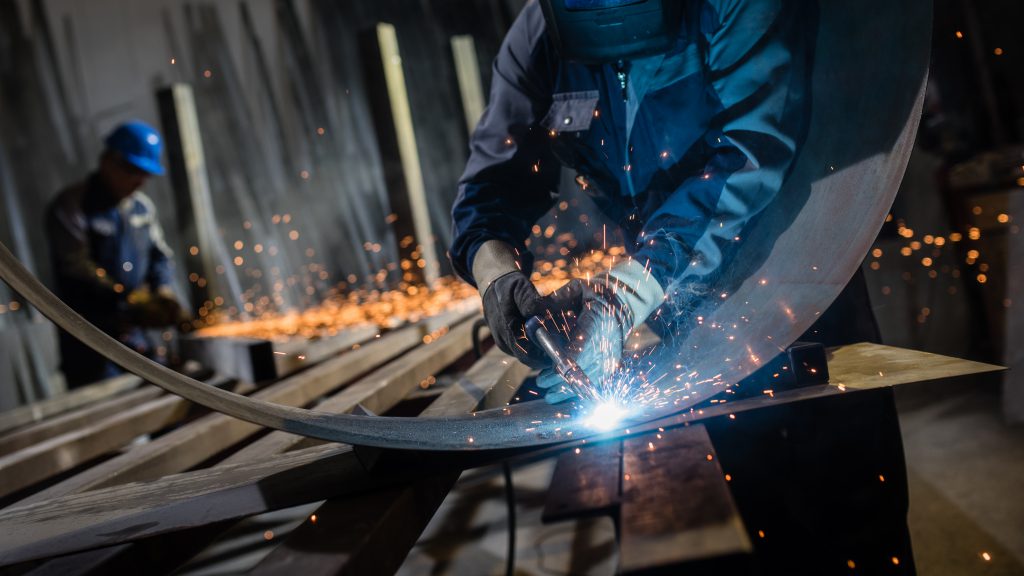Sheet Metal Workers
Starting Wage
$23.12/hr
Journey-Level Wage
$43.31/hr
***The listed wages may vary by state and county.***
Rock-Solid Benefits
-

Retirement And Pension Funds
-

Wellness Program
-

Health Care
-

Vacation Fund
Career Requirements
-

Must Be 18 Years Old For Hire
-

High School Diploma or GED
-

Driver's License
-

Reliable Transportation

A construction worker uses a welding torch to cut metal sheet in workshop.
Do you like creating with your hands? Sheet metal workers transform flat sheets of metal into any size or shape required by a blueprint or verbal request. Being a sheet metal worker involves the fabrication, erection, installation, repair, replacing and servicing of all residential heating and air conditioning systems and the architectural sheet metal on such residences.
Workers are skilled and knowledgeable about heating, cooling and ventilation systems; techniques of welding, and the functions of compressors and condensers in the refrigeration cycle. Working with sheet metal also involves solar installation, hoisting and rigging, soldering, energy management and retrofitting of environmental systems.
APPLY TODAY!
Enroll in a sheet metal worker apprenticeship through Sheet Metal Workers Local 10, here. Applications for apprenticeship are taken year-round, by appointment. Call Carl Zitzer at 651-779-6264.
RECOMMENDED HIGH SCHOOL CLASSES
The recommended prerequisites for high school students include construction courses, shop courses, and mechanical-focused hands-on classwork. Algebra and geometry are applied to the sheet metal trade almost every day.
Tech-savvy students interested with coding, computer science or engineering and drafting classes (CAD) may apply these skills and programs in the trade.
Completion of high school classes does not count for hours in the apprenticeship program, but the experience and classes taken are valuable in building students’ skill sets.
High school and college-aged students interested in becoming a sheet metal worker apprentice may apply to Sheet Metal Workers Local 10 and receive a list of contractors. After signing with a contractor, the student may start a pre-apprenticeship sheet metal program. Contact Carl Zitzer at 651-779-6264 for more information.
TRADE OR TECHNICAL SCHOOL CREDIT
A two-year diploma is not required to qualify for a sheet metal worker apprenticeship. However, attending a technical school for a construction-related degree advances a candidates’ rank in the pool of apprenticeship contenders.
Local 10 recommends St. Paul College or Hennepin Technical College, which both offer sheet metal and HVAC specialty programs. Contact Carl Zitzer at 651-779-6264 to confirm credits transfer prior to signing up for classes.
APPRENTICESHIP PROGRAM
A sheet metal worker apprenticeship is a four-year program in which apprentices earn while they receive both on-the-job practical training and classroom instruction. The apprenticeship requires 8,000 hours of on-the-job training and 180 classroom-training hours each year.
At the time of application, applicants will be required to take a test designed to determine competence in mechanical aptitude, mathematics, and reading comprehension. The applicant will be ranked according to aptitude test score, work experience, high school or equivalent grades and post-secondary sheet metal training, if any. Applicants will be placed in descending order of ranking as demand warrants.
Apprentices need to pass City of Minneapolis or St. Paul competency card tests to legally work on city job sites. Training for this requirement is provided in-house.
Tuition costs amount to about $550 dollars per year. However, if an apprentice never misses a day of class or work he/she will be reimbursed the full amount.
TOOLS NEEDED
Workers need to provide themselves with their own hand tools (such as screwdriver, prick punch, dividers, crescent wrench, small whitney, center punches, pliers, hammers, etc). Cost for these tools will run around $600.
TRANSPORTATION REQUIREMENTS
Local 10 represents many shops outside of the Metropolitan area. Workers are sometimes required to move around and are expected to be able to get to the job on time.
When a sheet metal worker apprentice can demonstrate competence in vital skills, the apprenticeship will be complete. Apprentices will graduate to journey-level status.
KEY SKILLS
Hand-eye coordination and having nimble fingers is necessary when installing sheet metal. Sheet metal workers use a wide-range of hand tools and equipment during installation and maintenance. Apprentices also need to be physically strong enough to lift heavy sheets onto roofs and move materials around.
Sheet metal workers must be good at communicating their ideas and ready to ask questions if needed, to clarify the scope of work on a project. The ability to focus and complete tasks in a loud working environment is critical for a sheet metal worker’s success.
High school students preparing to become a sheet metal worker should seek out part-time jobs that require being physically fit and working outdoors in a variety of conditions. Athletes, team captains and being a member of a team is beneficial experience.
MILITARY
Military members applying for a sheet metal worker apprenticeship are put to work as soon as possible. Contact Carl Zitzer at 651-779-6264 to arrange an interview. Veterans can also search job opportunities at https://helmetstohardhats.org/.
Local Offices
Twin Cities
Sheet Metal Workers Local #10
White Bear Lake, MN 55110
Central Minnesota
Central Minnesota Sheet Metal J.A.T.C.
Apprenticeship Coordinator: Steve Raatikka
Email: sraatikka@smw10.org
Northern Minnesota
Duluth-Superior J.A.T.C.
Iron Range J.A.T.C. Fax: 218- 729-7028
Training Coordinator: Richard Barlage
Asst. Coordinator: Jim Edmundson Email: patch40@juno.com
Southern Minnesota
Training Coordinator: Jason Damman Email: jdamman@smw10.org
(507) 601-7014
Drug Testing
An employer/contractor/apprenticeship instructor may require drug and alcohol testing of employees and applicants for employment, including random testing.
